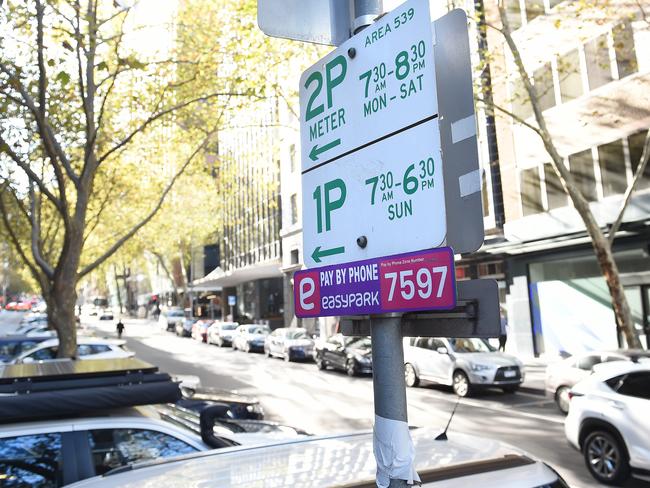Cash-strapped workers say bosses demanding return to office can foot their parking, petrol costs
Millennials have been revealed as the most reluctant to return to the office as their wages fail to keep pace with the cost of living surge, but one boss has stepped in with a 20 per cent pay rise for all staff.
Victoria
Don't miss out on the headlines from Victoria. Followed categories will be added to My News.
Millennials and Gen Zers — not their younger or older counterparts — are chief among workers who are reluctant to return to the office, as they struggle to afford childcare and commuting costs, and seek more work-life balance and family time.
A recent poll by leading software research site Capterra reveals 78 per cent of Generation Z workers and 75 per cent of millennial workers were feeling the pinch of rising cost of living and wanted every assistance possible from their bosses to help make ends meet.
It compared with 69 per cent of Generation X workers.
Financial assistance they say they need to work from the office rather than home includes help with covering the cost of childcare, commuting and parking.
A further 75 per cent of millennials said their salaries had not kept pace with how much money they now had to spend on work expenditures — the highest of any generation.
Gen Y or millennials were born between 1980 and 1994, Gen X between 1965 and 1979, Gen Z between 1995 and 2009 and Baby Boomers between 1946 and 1964.


“Millennials are likely at a stage in life where they are building their careers and are in peak child-rearing years, with childcare often expensive. A third of millennial survey takers also live in a city or urban area where job opportunities are more likely, but housing costs are higher,” Capterra analyst Laura Burgess said.
“Aside from spending most on professional clothes to work on-site, Millennials also see their expenditures go toward childcare costs. The millennials who would like to work remotely say it is mainly to improve their work-life balance, giving parents more time to spend with their families or manage their personal schedules.”
If companies expected employees to be on-site more often, support with work-related costs and flexible arrangements was crucial for employee retention and satisfaction, she said.
“Flexible schedules can help workers manage personal commitments, such as child obligations for millennials or healthcare appointments for older generations. Providing childcare subsidies, student loan repayment programs and retirement contributions can significantly benefit workers of all ages,” she said.
Chief executive officer of art framing company Fantastic Framing, Avi Efrat, said his business had provided a 20 per cent pay rise to all staff members last year when rising cost of living started to really impact their lives.
Fantastic Framing, which has stores in Malvern East, Kew, St Kilda and Hampton, also reviewed bonus structures to ensure staff were being adequately rewarded for their hard work in tough times, Mr Efrat said.

“One of our employees was able to take home a $2000 bonus within a matter of weeks,” he said.
“Employers have a responsibility to look after their staff when cost pressures are mounting and we consistently review salaries to make sure everyone is adequately looked after.”
It comes as workers are increasingly demanding their employers cover their parking costs if they come into the office, and many also want their public transport and petrol costs reimbursed.
With more Victorian bosses asking employees to return to their offices post Covid lockdowns — at the same time workers are being hit with mortgage interest rate rises and other cost of living pressures — many feel the travel costs associated with commuting would cause too much extra financial pain, Capterra research showed.
Employees were starting to demand and seek assistance from their companies to help sustain their work lives, whether on-site or remotely, it said.
A whopping 66 per cent of nearly 250 employees surveyed said that on-site workers’ parking fees should be covered by their employers, while 74 per cent believed that the cost of required clothing or uniforms should also be shouldered by their bosses.
About half felt employers should help pay for public transport or petrol costs for them to make their way into the office, if that’s where they had to be.
“The cost of living is undeniably making managing work-related expenses exponentially harder. However, with proper policies in place, companies can provide support that will take some pressure off their workers,” Capterra’s Ms Burgess said.
“Our research reveals that 71 per cent of employees have salaries that do not keep up with rising costs, this reinforces that companies should study and consider providing support to their employees that can reduce financial burdens and increase productivity.”
The survey consulted about 250 Australian employees, to discover what work-related expenses they thought employers should cover, what their bosses were currently doing to provide support and how inflation had impacted the way they kept up with work commitments and dealing with daily costs.


Commuting, office attire and food expenses were among the main reasons employees were reluctant to return to their offices full time, she said.
About 75 per cent of Australians had experienced rises in job-related expenses in the last year, which was significantly higher than the 60 per cent global average, Capterra said.
“It is no surprise Australians are feeling the pressure. As the push to return to office increases in the Australian working landscape, employees will need to allocate more expenditure to commuting, parking and food,” it said.
“Given the recent Senate inquiry into some large supermarkets’ alleged price gouging, it is no surprise that 94 per cent felt that groceries were the expense that increased the most. As it is a struggle for their salaries to keep up with expenses, financial wellness programs can help employees manage and budget their spending.”
However, it was not just return to the office demands workers wanted financial help in meeting, with 77 per cent of employees believing a computer should be supplied to remote workers, 67 per cent that home office equipment should be provided and 44 per cent that home internet costs should be subsidised.



